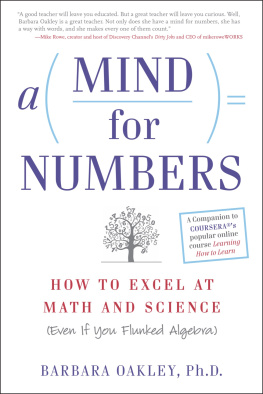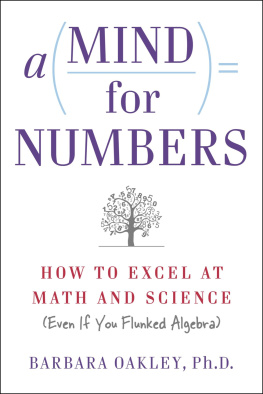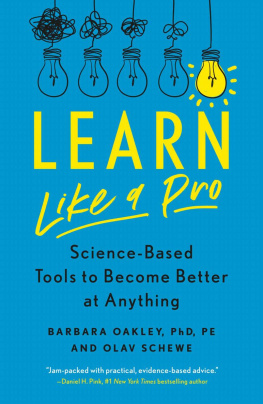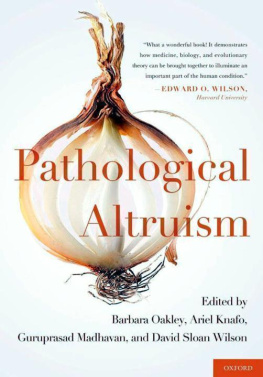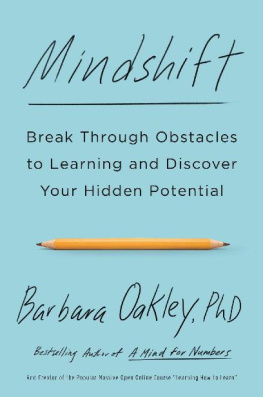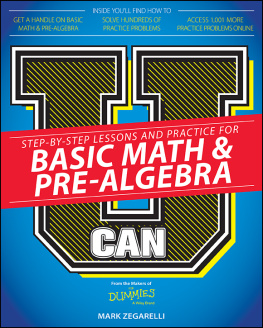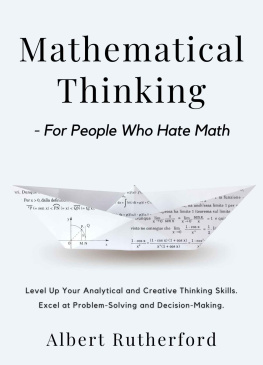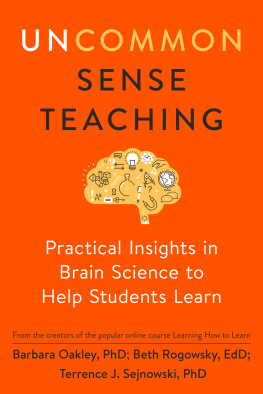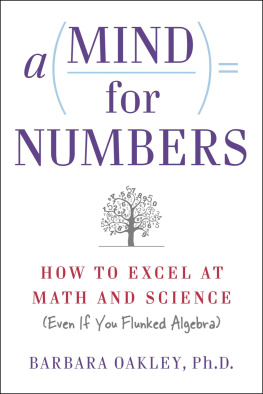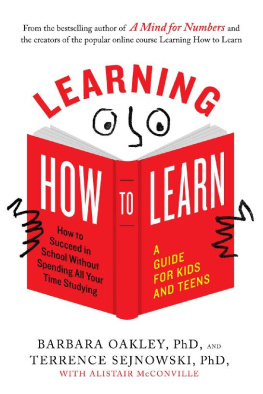Being good at science and mathematics isnt just something you are; its something you become. This users guide to the brain unmasks the mystery around achieving success in mathematics and science. I have seen far too many students opt out when they hit a rough patch. But now that learners have a handy guide for knowing better, they will also be able to do better.
S HIRLEY M ALCOM , HEAD OF EDUCATION AND HUMAN RESOURCES PROGRAMS , A MERICAN A SSOCIATION FOR THE A DVANCEMENT OF S CIENCE
A Mind for Numbers is an excellent book about how to approach mathematics, science, or any realm where problem solving plays a prominent role.
J. M ICHAEL S HAUGHNESSY , PAST PRESIDENT OF THE N ATIONAL C OUNCIL OF T EACHERS OF M ATHEMATICS
I have not been this excited about a book in a long time. Giving students deep knowledge on how to learn will lead to higher retention and student success in every field. It is a gift that will last them a lifetime.
R OBERT R. G AMACHE , P H .D., A SSOCIATE V ICE P RESIDENT , A CADEMIC A FFAIRS , S TUDENT A FFAIRS , AND I NTERNATIONAL R ELATIONS , U NIVERSITY OF M ASSACHUSETTS , L OWELL
A Mind for Numbers helps put students in the drivers seatempowering them to learn more deeply and easily. This outstanding book is also a useful resource for instructional leaders. Given the urgent need for America to improve its science and math education so it can stay competitive, A Mind for Numbers is a welcome find.
G EOFFREY C ANADA , PRESIDENT , H ARLEM C HILDREN S Z ONE
An ingeniously accessible introduction to the science of human cognitionalong with practical advice on how to think better.
J AMES T ARANTO , THEWALLSTREETJOURNAL
Its easy to say work smarter, not harder, but Barbara Oakley actually shows you how to do just that, in a fast-paced and accessible book that collects tips based on experience and sound science. In fact, Im going to incorporate some of these tips into my own teaching.
G LENN H ARLAN R EYNOLDS , B EAUCHAMP B ROGAN D ISTINGUISHED P ROFESSOR OF L AW , T HE U NIVERSITY OF T ENNESSEE
A Mind for Numbers is a splendid resource for how to approach mathematics learning and, in fact, learning in any area. Barbara Oakleys authoritative guide is based on the latest research in the cognitive sciences, and provides a clear, concise, and entertaining road map for how to get the most out of learning. This is a must-read for anyone who has struggled with mathematics and anyone interested in enhancing their learning experience.
D AVID C. G EARY , C URATORS P ROFESSOR OF P SYCHOLOGICAL S CIENCES AND I NTERDISCIPLINARY N EUROSCIENCE , U NIVERSITY OF M ISSOURI
For students afraid of math and science and for those who love the subjects, this engaging book provides guidance in establishing study habits that take advantage of how the brain works.
D EBORAH S CHIFTER , PRINCIPAL RESEARCH SCIENTIST , SCIENCE AND MATHEMATICS PROGRAMS , E DUCATION D EVELOPMENT C ENTER , I NC .

JEREMY P. TARCHER/PENGUIN
Published by the Penguin Group
Penguin Group (USA) LLC
375 Hudson Street
New York, New York 10014

USA Canada UK Ireland Australia New Zealand India South Africa China
penguin.com
A Penguin Random House Company
Copyright 2014 by Barbara Oakley
Penguin supports copyright. Copyright fuels creativity, encourages diverse voices, promotes free speech, and creates a vibrant culture. Thank you for buying an authorized edition of this book and for complying with copyright laws by not reproducing, scanning, or distributing any part of it in any form without permission. You are supporting writers and allowing Penguin to continue to publish books for every reader.
Most Tarcher/Penguin books are available at special quantity discounts for bulk purchase for sales promotions, premiums, fund-raising, and educational needs. Special books or book excerpts also can be created to fit specific needs. For details, write: Special.Markets@us.penguingroup.com.
Library of Congress Cataloging-in-Publication Data
Oakley, Barbara A.
A mind for numbers : how to excel at math and science (even if you flunked algebra) / Barbara Oakley, Ph.D.
p. cm.
Includes bibliographical references and index.
ISBN 978-1-101-62161-5
1. Math anxiety. 2. MathematicsStudy and teachingPsychological aspects. 3. Educational psychology. I. Title.
QA11.2.O33 2014 2014003665
501'.9dc23
Version_3
A Mind forNumbers is dedicated to Dr. Richard Felder, whose brilliance and passion have launched extraordinary improvements worldwide in the teaching of science, mathematics, engineering, and technology. My own successes, like those of tens of thousands of other educators, grow out of his fertile educational approaches. Il miglior maestro.
The Law of Serendipity: Lady Luck favors the one who tries
contents
foreword
Y our brain has amazing abilities, but it did not come with an instruction manual. Youll find that manual in A Mind for Numbers. Whether youre a novice or an expert, you will find great new ways to improve your skills and techniques for learning, especially related to math and science.
Henri Poincar was a nineteenth-century mathematician who once described how he cracked a difficult mathematical problem that he had been intensively working on for weeks without success. He took a vacation. As he was getting on a bus in the south of France, the answer to the problem suddenly came to him, unbidden, from a part of his brain that had continued to work on the problem while he was enjoying his vacation. He knew he had the right solution even though he did not write down the details until he later returned to Paris.
What worked for Poincar can work for you too, as Barbara Oakley explains in this insightful book. Surprisingly, your brain can also work on a problem even while you are sleeping and are not aware of anything. But it does this only if you concentrate on trying to solve the problem before falling asleep. In the morning, as often as not, a fresh insight will pop to mind that can help you solve the problem. The intense effort before a vacation or falling asleep is important for priming your brain; otherwise it will work on some other problem. There is nothing special about math or science in this regardyour brain will work just as hard at solving social problems as on math and science problems, if that is what has been on your mind recently.
You will find many more insights and techniques about how to learn effectively in this fascinating and timely book, which looks at learning as an adventure rather than hard labor. You will see how you can fool yourself about whether you actually know the material; you will find ways to hold your focus and space out your practice; and you will learn to condense key ideas so you can hold them more easily in your mind. Master the simple, practical approaches outlined here and you will be able to learn more effectively and with less frustration. This wonderful guide will enrich both your learning and your life.
Terrence J. Sejnowski, Francis Crick Professor, Salk Institute for Biological Studies
preface
T his book can make a profound difference in how you look at and understand learning. You will learn the

